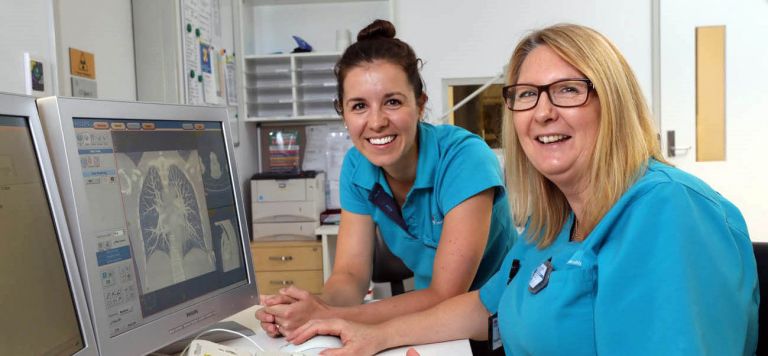About our services
We offer a variety of allied health services, in our hospitals and health centres and community settings. Some of these are permanent, and some visit from other areas.
Many can also be provided virtually using telephone or video technology when appropriate.
To find out what services are offered within your local community, contact your local health service and ask to speak to the Community Health Centre.
Find more details about our allied health services below:
Our services
Dietitians help people understand the relationship between food and health, and make healthy choices to prevent and treat illness and disease.
Dietitians work with people of all ages in community, inpatient and outpatient settings to assess nutritional needs and help treat a broad range of medical conditions.
Dietetics services offered in communities across Western NSW LHD may vary but include diabetes, paediatrics (children), oncology and renal.
Occupational therapy enables people to participate in their meaningful activities.
Occupational therapists work with people who experience difficulties in these areas, from injury, illness, physical disability or mental health.
Our community occupational therapists work in a range of areas and age groups including:
Children - assist children and families who have difficulty performing everyday activities including self-care, school, and play activities.
Adults - provide assessment for home modifications and equipment to promote living safely at home and engaging in daily life activities at home and in the community.
Promote health and wellbeing through community programs, such as ‘Stepping On’, to help maintain independence, prevent falls and increase strength and balance.
Palliative care - support the person and family with equipment, home modifications and education on fatigue management to enable the person to continue to live at home.
Brain injury rehabilitation - supports people living a brain injury in the community to address the complex combination of cognitive, behavioural and physical challenges.
Hand therapy - to promote the return of functional use of your hand after injury or surgery and chronic conditions such as arthritis. These specialised outpatient services are based from our larger hospitals.
Lymphoedema management - limited services to provide lymphoedema treatment and assessments as part of the early intervention and prevention of chronic breast cancer-related lymphoedema.
Physiotherapists assess and treat people of all ages and abilities who need help to improve their physical movement and function. This might be because of age, illness or injury, surgery or other reasons.
Physiotherapy often involves exercises, manual therapy and education.
Our physiotherapists provide services in community, inpatient and outpatient settings, which may include:
orthopaedic, neurological, pulmonary and cardiac rehabilitation
women’s and men’s health
paediatric care
pain and lymphoedema management
falls prevention coaching
musculoskeletal care such as neck, back or shoulder problems
fracture management
hydrotherapy at some sites.
Community psychology services are available to children, young people, families and adults across Western NSW. Services are flexibly delivered in multiple settings, including home visits and community centres, to meet the needs of the community. We also run some group therapy and education sessions. Psychology services prioritise vulnerable population groups, including Aboriginal and Torres Strait Islander peoples, who may not be eligible or able to access alternate services. The availability of psychological assessment and treatment services can vary across the Local Health District.
Psychologists may provide services to the following groups:
- children and young people with mild to moderate mental health disorders
- ante and post-natal services
- chronic health in children and adults.
Specialist services exist at larger hospital sites, and may include:
- child developmental assessment clinic
- feeding and eating disorders clinic.
Community Psychology services do not provide acute mental health services (i.e. risk and safety). See Mental health drug and alcohol services for acute mental health service and referral information.
Community social workers provide counselling, support and practical assistance for people in psychosocial distress across all ages. The distress can include traumatic events such as unexpected death or injury, domestic and family violence, and people at risk of harm.
Alternatively, the distress may be more long term such as complex grief, family breakdown, homelessness and poverty, the experience of anxiety and depression, and emotional or behavioural difficulties of childhood.
Services offered include:
case management
counselling and advocacy
crisis intervention
mediation
psychosocial assessment and education
therapeutic counselling in individual, group and family settings.
Speech pathologists diagnose and treat children and adults who may experience communication difficulties including speech, language, voice, fluency or swallowing difficulties.
Speech pathologists are able to assess a person’s communication or swallowing skills and devise a treatment plan that best suits their needs. Communication or swallowing difficulties may arise as a result of developmental delays, stroke, brain injuries, learning disability, intellectual disability, cerebral palsy, dementia and hearing loss or other problems.
In Western NSW our speech pathology services for adults may be available in a clinic or by virtual care (telehealth), with community, school or home settings also sometimes available for children.
If you are waiting to access speech pathology services, visit our Waiting for speech pathology pages for helpful information and resources.
Find allied health services
Use our Service Directory to find a health service near you.
